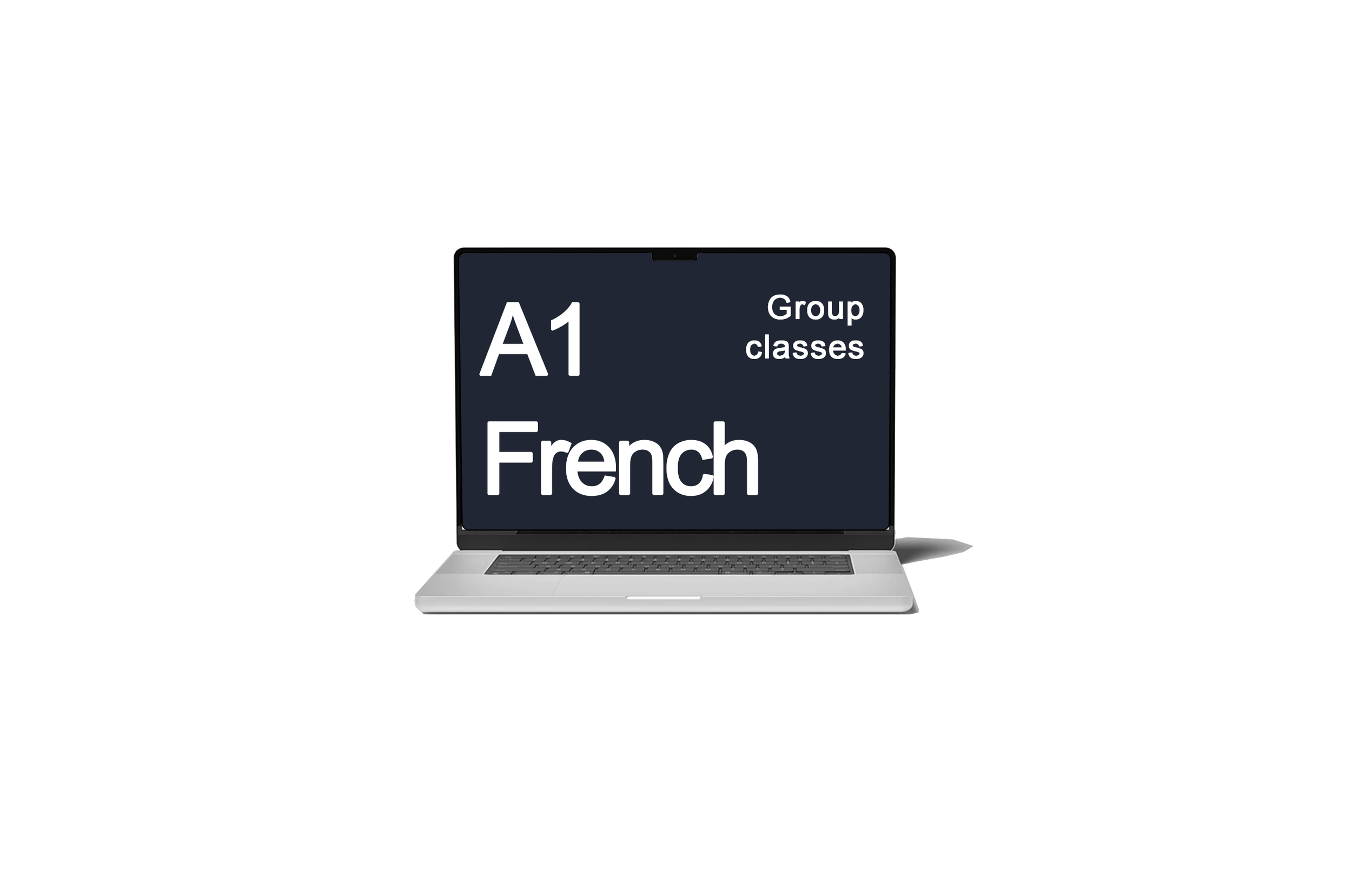⚪
Introduction
Course details
Whether you’re applying for a family visa, job opportunities, or simply want to live comfortably in Switzerland, France or Canada, our structured A1 French program is designed for Tamil speakers to succeed step by step.
Why Learn French A1?
French A1 is often required for residence permits and family reunification visas, Certain job opportunities in Switzerland, France and Canada, Everyday life — shopping, travel, school, or doctor’s visits
Our program is practical, exam-focused, and designed with Tamil guidance, so you don’t just learn French — you pass the exam and use it in daily life.
A1
French - Group classes | Online
Next start : Tuesday, October 7, 2025
10% Early bird discount
✓⃝ Group learning
✓⃝ 72 total learning hours
✓⃝ Access to student portal
✓⃝ Vocabulary with Tamil & English meaning.
✓⃝ DELF A1 exam preparation
✓⃝ Certificate upon completion
1950 CHF
1755 CHF
French 1-to-1 Private classes | Online
A1
2800 CHF
Next start : Tuesday, October 7, 2025
Take a minute to write an introduction that is short, sweet, and to the point. If you sell something, use this space to describe it in detail and tell us why we should make a purchase. Tap into your creativity. You’ve got this.
10% Early bird discount
2520 CHF
Course Outline
Our A1 syllabus is carefully designed for beginners. Each chapter brings you closer to confidently speaking French and passing your exam.
-
L’alphabet – The alphabet
Les accents français – French accents
Les salutations – Greetings
Les mots de politesse – Polite words
Les articles définis et indéfinis – Definite and indefinite articles
Le vocabulaire de la classe – Classroom vocabulary
Les pronoms personnels sujets – Subject pronouns
-
Les chiffres 1–20 – Numbers 1–20
Le formulaire – Form (document)
La prononciation – Pronunciation
Se présenter – Introducing oneself
Le vocabulaire des couleurs – Vocabulary of colors
Les mots interrogatifs – Interrogative words
Les adjectifs interrogatifs – Interrogative adjectives
Les questions (formelles et informelles) – Questions (formal and informal)
Les questions de base – Basic questions
-
Les adjectifs possessifs – Possessive adjectives
Les verbes être et avoir – Verbs “to be” and “to have”
La France – France
Les transports en commun – Public transport
La famille – Family
Les jours, les mois et l’année – Days, months, and the year
Les saisons – Seasons
Les mots du temps – Time-related words
-
Les verbes du premier groupe – First group verbs
Les adjectifs de quantité – Quantity adjectives
La météo – Weather
Les chiffres de 20 à 1000 – Numbers 20–1000
L’heure – Telling the time
Le vocabulaire du sport – Sports vocabulary
Les verbes du deuxième groupe – Second group verbs
Il y a et il n’y a pas – There is / There isn’t
-
Les lieux de la ville – Places in the city
Les articles contractés – Contracted articles
Les prépositions de temps – Time prepositions
Les mouvements et lieux – Movements and places
Le vocabulaire des loisirs – Leisure vocabulary
Les verbes du troisième groupe – Third group verbs
Les connecteurs – Connectors
-
La négation – Negation
Les repas français – French meals
Les verbes pronominaux – Pronominal verbs
Ma journée – My day
Le vocabulaire des professions – Vocabulary of professions
Oral dans un café – Speaking in a café
Les pronoms toniques – Stressed pronouns
-
Les pluriels de noms – Plural nouns
Les pronoms démonstratifs – Demonstrative pronouns
Les villes et les pays – Cities and countries
Le vocabulaire des légumes et fruits – Vocabulary of vegetables and fruits
Oral au marché – Speaking at the market
Le COD (complément d’objet direct) – Direct object complement (COD)
Le vocabulaire des vêtements – Clothing vocabulary
Oral au magasin de vêtements – Speaking at the clothing store
-
Le COI (complément d’objet indirect) – Indirect object complement (COI)
Carte postale – Postcard
Un affichage – A notice / poster
Direction France – Direction France
Oral à la gare – Speaking at the train station
Le vocabulaire de la maison – House vocabulary
Oral à l’hôtel – Speaking at the hotel
E-mail – Email
L’article partitif – Partitive article
Épicerie – Grocery store
-
Oral dans un restaurant – Speaking at a restaurant
L’invitation – Invitation
Le passé composé – Past tense (passé composé)
Le vocabulaire des animaux – Animal vocabulary
Oral chez une bougerie – Speaking at a bougerie
-
Vocabulaire du corps humain (chez le médecin) – Vocabulary of the human body (at the doctor)
Vocabulaire de la pâtisserie et des boulangeries – Vocabulary of pastries and bakeries
Oral chez une pâtisserie – Speaking at a pastry shop
Oral chez un boulanger – Speaking at a bakery
Le futur simple – The simple future tense
Oral au cinéma – Speaking at the cinema
What they’re saying
-
“It all begins with an idea. Maybe you want to launch a business.”
Laurie Payton
-
“It all begins with an idea. Maybe you want to launch a business.”
Jamie Kokot
-
“It all begins with an idea. Maybe you want to launch a business.”
Lindsey Beumer
-
“It all begins with an idea. Maybe you want to launch a business.”
Keith Finley
Frequently Asked Questions
-
Not at all! Our A1 course is built for complete beginners. We start right from the very basics — how to say “Bonjour,” how to introduce yourself, and how to handle simple everyday conversations. If you’ve never studied French before, don’t worry, we guide you step by step.
-
Yes — and this is one of the biggest advantages of French Blossom for Tamil-speaking students. Our classes are primarily conducted in French (with English support), But unlike most schools, we also provide Tamil guidance whenever necessary.
If a grammar point is confusing, we explain it in simple Tamil terms so you fully understand.
Our course materials (vocabulary lists, key grammar explanations, common dialogues) are given in French with both English and Tamil meanings. This way, you never feel lost, and you can compare across the three languages easily.
This unique Tamil support is especially useful for beginners who are comfortable learning in Tamil.
💡 In short: you learn French with the comfort of Tamil guidance, making the process smoother, faster, and more enjoyable.
-
Yes! You can join our classes from anywhere, all you need is a stable internet connection.
However, for your safety and learning experience, we strongly advise against attending classes while doing other activities that require your full attention. This includes,
Driving or travelling behind the wheel
Operating machinery or equipment
Cooking or handling hot surfaces
Supervising young children
French requires focus and active participation. To make the most of your learning — and to stay safe — please attend your class in a quiet, distraction-free environment where you can listen, speak, and interact confidently.
-
We understand that life can be busy — with family responsibilities, shift work, or unexpected commitments. If you miss a class:
For group classes, you’ll receive the lesson notes and materials for that session.
For private classes, you can reschedule with your tutor depending on availability.
This ensures you never fall behind, even if you miss a day or two.
-
Yes. At the end of the course, you will receive a French Blossom Certificate of Completion. But more importantly, our course is designed to prepare you for the official DELF A1 exam, which is recognized worldwide. We guide you on what to expect on exam day, and we run mock test sessions so you feel confident before the real thing.
-
Our groups are kept small (maximum 6–8 students) so everyone has the chance to speak, practice, and ask questions. And the tutor rotates attention between students and uses interactive methods, so every session feels personal.
-
Most French schools in Switzerland are either fully French/English only or very expensive private lessons. For Tamil-speaking students, this creates a gap — they either struggle to understand or cannot afford 1-to-1.
French Blossom is unique because:
We provide Tamil guidance + trilingual material (French–English–Tamil).
Our pricing is affordable compared to Swiss private schools, but still premium enough to ensure quality teaching.
We focus on exam success (DELF A1)
-
At French Blossom, learning doesn’t stop when the Zoom class ends — we give you full support to practice, review, and prepare confidently for your exam.
Speaking & Pronunciation in Class
Every session includes active speaking practice. You’ll repeat words and sentences with the teacher, take part in guided dialogues, and receive direct feedback to improve pronunciation and fluency.
Exclusive Student Portal (after enrollment)
Once you’ve attended your free trial and decided to join our program, you’ll receive a secure student account on our website. This portal is your personal French hub, where you can access:
Audio Hub — listen to native French, practice listening exercises
Interactive exercises — practice vocabulary, grammar, and sentence building.
Mock test practice — get familiar with A1 exam formats.
Designed for Tamil Speakers
For Tamil-speaking students who may struggle with French sounds and structures, this combination of live practice + audio training + trilingual explanations is a huge advantage. It ensures that you don’t just attend classes — you actually absorb the language and gain confidence to pass your A1 exam successfully.
-
We accept credit card, or bank transfer. To make things easier, you can pay in 3 instalments across the 3 months. This makes the program more affordable.
-
Yes. A1 French exam is required for residence permits, family reunification visas, or certain job opportunities.
By the end of the course, you’ll be confident to take the official DELF A1 exam, which is internationally recognized. Passing this exam can directly support your visa or work requirements.




